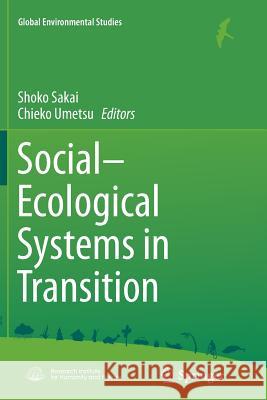Social-Ecological Systems in Transition » książka



Social-Ecological Systems in Transition
ISBN-13: 9784431563860 / Angielski / Miękka / 2016 / 198 str.
Social-Ecological Systems in Transition
ISBN-13: 9784431563860 / Angielski / Miękka / 2016 / 198 str.
(netto: 441,85 VAT: 5%)
Najniższa cena z 30 dni: 457,33
ok. 30 dni roboczych.
Darmowa dostawa!
This book presents an overview of current knowledge about social-ecological systems (SESs), a productive new field dedicated to understanding the relationships between human society and nature.
Section 1: Frameworks and concepts1. Theoretical frameworks for the analysis of social-ecological systemsGraeme S. CUMMING (University of Cape Town)Section 2: Ecosystem under human activities2. The recovery of biodiversity after swidden cultivation in the tropical rainforests of Malaysian BorneoTakenaka Kohei TAKANO (RIHN), et al.3. Mongolian nomadism and the relationship among livestock grazing, pasture vegetation, and soil alkalizationRyosuke KODA (RIHN)4. Plant diversity and productivity of Mongolian nomadic pasture in relation to land useNoboru FUJITA (RIHN), Erdenegerel ARIUNBOLD (Institute of Geoecology, Mongolian Academy of Science, Mongolia)5. Reshaping neighborhood parks for biodiversity and people: A case of Unsung Socio-Ecological Systems in Bangalore, IndiaM. Soubadra DEVY (Ashoka Trust for Research in Ecology and the Environment (ATREE), India)Section 3: Adaptation to unpredictability6. Quantitative predictions for ecological and economic sustainability in Mongolian pastoral systems Satoshi TATO (RIHN)7. Trajectories of adaptation: A retrospectus for future dynamicsDonald R. NELSON (University of Georgia) and Timothy J. FINAN (University of Arizona)Section 4: Resilience of social systems8. Ingredients for social-ecological resilience, poverty traps and adaptive social protection in Semi-Arid AfricaPetra TSCHAKERT (Department of Geography, Pennsylvania State University), Jen SHAFFER (Earth and Environmental Systems Institute, Pennsylvania State University)9. Dynamics of social-ecological systems: the case of farmers’ food securityin the semi-arid tropicsChieko UMETSU, Thamana LEKPRICHAKUL, Hidetoshi MIYAZAKI, Yudai ISHIMOTO (RIHN)
Shoko SAKAI (Associate Professor, Research Institute for Humanity and Nature) She started her academic career in botany and ecology. She conducted several research projects on plant reproduction and plant-animal interactions in the tropical forests of Borneo and Panama. In recent years, her interests have broadened to include interactions between ecosystems and human societies. She was an associate professor at Center for Ecological Research, Kyoto University from 2004 to 2008 and started to work at RIHN since 2008. She is a leader of the RIHN project “Collapse and restoration Ecosystem Network under human activity”. She is an coeditor of the book “Pollination ecology and forest canopy: Sarawak studies” published from Springer, NY in 2005. Chieko Umetsu (Professor, Nagasaki University) She received her M.A. from the International University of Japan and Ph.D. degree from the University of Hawaii at Manoa, Honolulu, U.S.A. Her publication includes “Basinwide Water Management: A Spatial Model” in Journal of Environmental Economics and Management (2003) with Ujjayant Chakravorty, and “Efficiency and Technical Change in the Philippine Rice Sector: A Malmquist Total Factor Productivity Analysis” in American Journal of Agricultural Economics (2003) with Thamana Lekprichakul and Ujjayant Chakravorty;“Water Allocation Under Distribution Losses: Comparing Alternative Institutions” in Journal of Economic Dynamics and Control (2009) with Ujjayant Chakravorty, Eithan Hochman and David Zilberman. At RIHN, she was a project leader of “Vulnerability and Resilience of Social-Ecological Systems" and conducts research in drought-prone Southern Zambia.
This book presents an overview of current knowledge about social–ecological systems (SESs), a productive new field dedicated to understanding the relationships between human society and nature. To make the reader aware of how SESs are necessary to maintain our society, the book begins with a broad perspective about what social–ecological systems are and what the related research issues in this field are as well. The second part discusses how human activities have changed ecosystems from temperate grasslands to tropical areas. The third part focuses on the adaptability of societies to unpredictable fluctuation in ecosystems, while the last part summarizes factors for the resilience of society against social and ecological shocks.
Human activities have severely degraded most natural ecosystems, which are now in critical condition. Various approaches have been developed to improve the SESs, to understand environmental problems and explore better ways to increase the sustainability both of ecosystems and of human societies. However, a clear perspective on how to address such problems is still lacking. Part of the difficulty arises because of the diversity and complexity of ecosystems and human societies. Another important factor is the effect of extremely rapid changes in the social and economic characteristics of social–ecological systems. Consequently, adaptability and resilience clearly are essential for the sustainability of SESs. Although there is no one, direct method to achieve high adaptability and resilience, a possible way is to compare and understand the diverse problems associated with differing social–ecological systems.
This published work makes a useful contribution to a greater understanding of the way that essential social responses linked to changes in ecosystems can potentially stimulate further research on this important and interesting subject. The book will attract the attention of scholars in environmental sciences, ecology, and sociology, and indeed of anyone interested in the concept of social–ecological systems.1997-2026 DolnySlask.com Agencja Internetowa
KrainaKsiazek.PL - Księgarnia Internetowa









